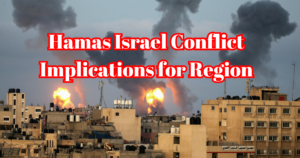
Hamas-Israel Conflict Implications for the Region
Data for the article has been taken from
- United States Institute of Peace, How the Israel-Hamas War Impacts Regional Relations
- National Public Radio (NPR)

Former Egyptian diplomat Hesham Youssef looks at what these unfolding events mean for the region and what comes next.
- Humanitarian Crisis and Israeli Military Response: The conflict has resulted in a humanitarian crisis, with concerns about mass displacement, particularly for Palestinians in Gaza. Israel’s military response has drawn international attention.
- Egypt and Jordan’s Concerns: Egypt and Jordan, as neighbouring countries, are worried about the situation. Egyptian President Abdel Fattah El-Sisi expressed unwillingness to settle the displacement issue at the expense of others. King Abdullah of Jordan is concerned about the displacement of one million Palestinians and the potential for a precedent leading to more displacement.
- Impact on Relations: The situation has strained Israel’s relations with Egypt and Jordan, which have been historically important peacemakers in the region. Israel had to withdraw its diplomatic staff from both countries, affecting diplomatic efforts.
- Hostages and Prisoners of War: The worsening relations between Israel, Egypt and Jordan could impact efforts to end the war and the release of hostages and prisoners of war, a role traditionally played by Egypt.
- Qatar’s Role: Qatar has been involved in negotiating the release of American hostages held by Hamas and has indicated its commitment to continuing these efforts.
- Israeli-Saudi Normalization: The conflict occurred as the United States was working on an Israeli-Saudi normalization agreement. Reports suggest that Saudi Arabia has frozen these talks, highlighting the importance of the Palestinian question in the normalization process.
- Arab League Resolution: The Arab League passed a resolution calling for an immediate cessation of the war, warning about the humanitarian and security consequences. It also cautioned against attempts to displace Palestinians and urged Israel to resume talks for a two-state solution based on the 2002 Arab Peace Initiative.
- Regional Stabilization and De-escalation: Regional stability and de-escalation have been key factors in Saudi Arabia’s interest in normalization. The resolution highlighted concerns about the spread of violence and the potential for a regional crisis.
- Hezbollah’s Potential Response: Hezbollah may consider a total defeat of Hamas as a redline, which could lead to more forceful actions from the group.
The Hamas-Israel Conflict: Economic Implications
- Economic Impact: The conflict is causing immense human suffering and affecting economic activity in both Gaza and Israel. Gaza has suffered infrastructure damage, power cuts, and shortages of basic necessities due to Israeli airstrikes. In Israel, the government has called up over 300,000 reservists, straining labour supply. Investment and tourism in Israel are also likely to be negatively impacted.
- Risk of Contagion: The conflict could spread beyond Gaza and Israel, leading to further human tragedy and affecting economies in the MENA (Middle East and North Africa) region and beyond. There’s a risk of conflict with Hezbollah in Lebanon, which could devastate Lebanon’s economy. Additionally, there’s a possibility of direct war with Iran, a major oil producer and rival of Israel, which could impact the world economy.
- Oil Prices and Diplomacy: The impact on the global economy, if the conflict remains contained, will primarily be higher oil prices. The conflict has already caused oil prices to rise, and this is likely to continue due to increased risk premiums. Diplomatic relations between Israel and Arab countries, which had improved in recent years, may be strained, reducing regional stability and affecting investment.
- Expert Insights: Analysts from the EIU suggest that the duration and scale of the war depend on the opening of a significant second front, such as in Lebanon or the West Bank. A ground offensive by Israel is expected, and the campaign’s duration could lead to a broader emergency government.
- Worst-Case Scenarios: Nomura’s analysts outline several possibilities, including an overly aggressive retaliation by Israel, conflict spilling into Lebanon through Hezbollah, and the worst-case scenario of direct military action against Iran, which could significantly impact the price of oil.
NPR Report
The text discusses an interview with Bruce Riedel, a former CIA analyst, and the implications of the Gaza-Israel conflict. Here are the key points and statements from the text:
- Hezbollah’s Support for Hamas: Hassan Nasrallah, the leader of Hezbollah, expressed strong support for Hamas and suggested the possibility of a wider conflict. He endorsed Hamas and emphasized that the October 7 attack on Israel was a purely Palestinian affair.
- Tensions Along the Israel-Lebanon Border: Riedel suggests that Hezbollah is likely to maintain a tense situation along the border with northern Israel, with occasional firefights, but not a full-scale war as seen in 2006.
- Conflict Spreading: The conflict has already spread from Gaza to the West Bank, with high tensions there, potentially leading to a third intifada. There is also concern about the conflict spreading to Lebanon and even Jordan.
- Unpredictable Nature: Riedel emphasizes the unpredictability of the situation, with the possibility of a wider conflict initiated by a single incident. Some voices in the Israeli government have advocated for a preemptive strike on Lebanon, although the United States has discouraged this.
- Gaza’s Future: The text mentions Israel’s suggestion for Gazans to leave the northern half of Gaza, indicating a desire for a buffer zone. However, the administration and control of this zone remain uncertain.
- Ongoing Conflict: Israeli Prime Minister Benjamin Netanyahu has rejected calls for a temporary cease-fire, insisting on the return of over 200 hostages taken by Hamas. The conflict is expected to last for months, with Israel having suffered a significant shock on October 7.
- Diplomatic Resolution: Riedel mentions the need for behind-the-scenes diplomacy to resolve the hostage situation, emphasizing the fluid and dangerous nature of the conflict.
Admin at The Pakistan Gazette

